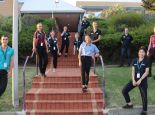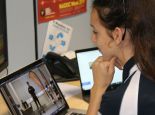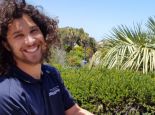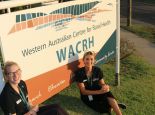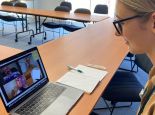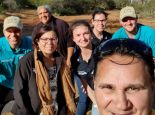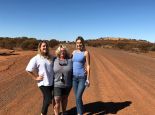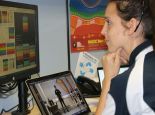The mission of the WA Centre for Rural Health is to deliver innovative rural health education to improve the health and wellbeing of rural communities.
We work with students from school level through to postgraduate level to introduce them to opportunities for rural health careers.
Students in different health professions from universities across Australia experience life-changing rural placements with us in the Midwest and the Pilbara of Western Australia.
Service-led placement models allow students to have deep and meaningful engagement with communities and fill service gaps for underprovisioned populations.
The WA Centre for Rural Health supports a range of allied health, nursing and pharmacy rural placements in the Midwest and Pilbara regions of Western Australia.
The WA Centre for Rural Health hosts placements for students including audiology, chiropractic, exercise physiology, exercise science, health promotion, nursing, nutrition and dietetics, occupational therapy, optometry, pharmacy, physiotherapy, podiatry, public health, social work, and speech pathology.
The centre offers students and universities the opportunity for community-based, clinical or project placements focused on Aboriginal health and interprofessional practice.
You will be part of a team and work with other students from a range of disciplines with support from experienced supervisors and local cultural mentors.
Learning about Aboriginal culture and identity from and with local Aboriginal leaders is a key component to a student placement with WACRH.
Placement Locations
The WA Centre for Rural Health offers community-based, clinical or project placements to allied health, nursing and pharmacy students in the Midwest and Gascoyne region of Western Australia. Students participating in Midwest placements are based in Geraldton in the City of Greater Geraldton, with opportunities for more rural experiences including service learning, community development projects and research activities in the Shire of Carnarvon, Shire of Mt Magnet, Shire of Yalgoo and Mullewa.
We also welcome honours students from across the health professions who are interested in rural research projects, and we have a number of experienced supervisors available to support them.
Find out more about Midwest students placements by emailing admin-wacrh@uwa.edu.au.
Service Learning - Midwest
Students undertaking a service learning placement work to meet pre-identified community needs by providing a service or completing a project that would otherwise be unavailable to the community. In the Midwest, allied health student service learning programs have been developed with the local Aboriginal Medical Service, schools across the region, residential aged-care facilities as well with community groups and agencies. These placements provide students with authentic experiential learning and they gain satisfaction from contributing to the health and wellbeing of others.
Gallery: Midwest Students
The WA Centre for Rural Health offers placements to allied health, pharmacy, nursing and midwifery students in the remote Pilbara region of Western Australia. Our Pilbara office is based in Karratha with placements being situated across the local government areas of the City of Karratha, Town of Port Hedland, Shire of Ashburton and Shire of East Pilbara.
We also welcome honours students from across the health professions who are interested in rural research projects, and have a number of experienced supervisors available to support them.
Find out more about Pilbara students placements by emailing admin-wacrh@uwa.edu.au.
Service Learning - Pilbara
Students undertake a range of different types of placements to meet identified community needs including clinical placements, community-based placements that provide a service that would otherwise be unavailable to the community, or project-based placements. Placement locations include schools, playgroups, home and aged-care service providers across the Pilbara. Placements are developed to combine profession-specific clinical experience, interprofessional education, cultural learning, community engagement and capacity building.


